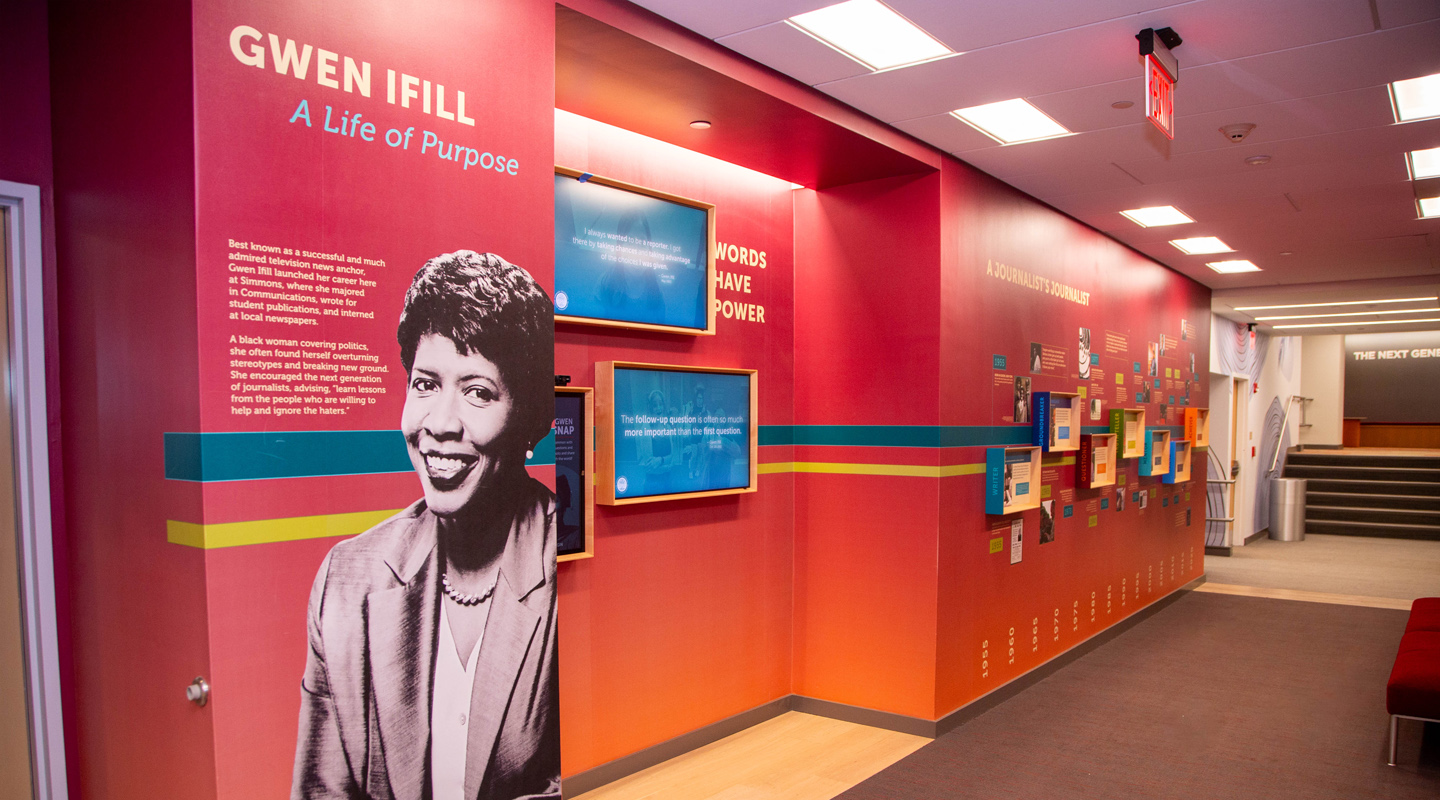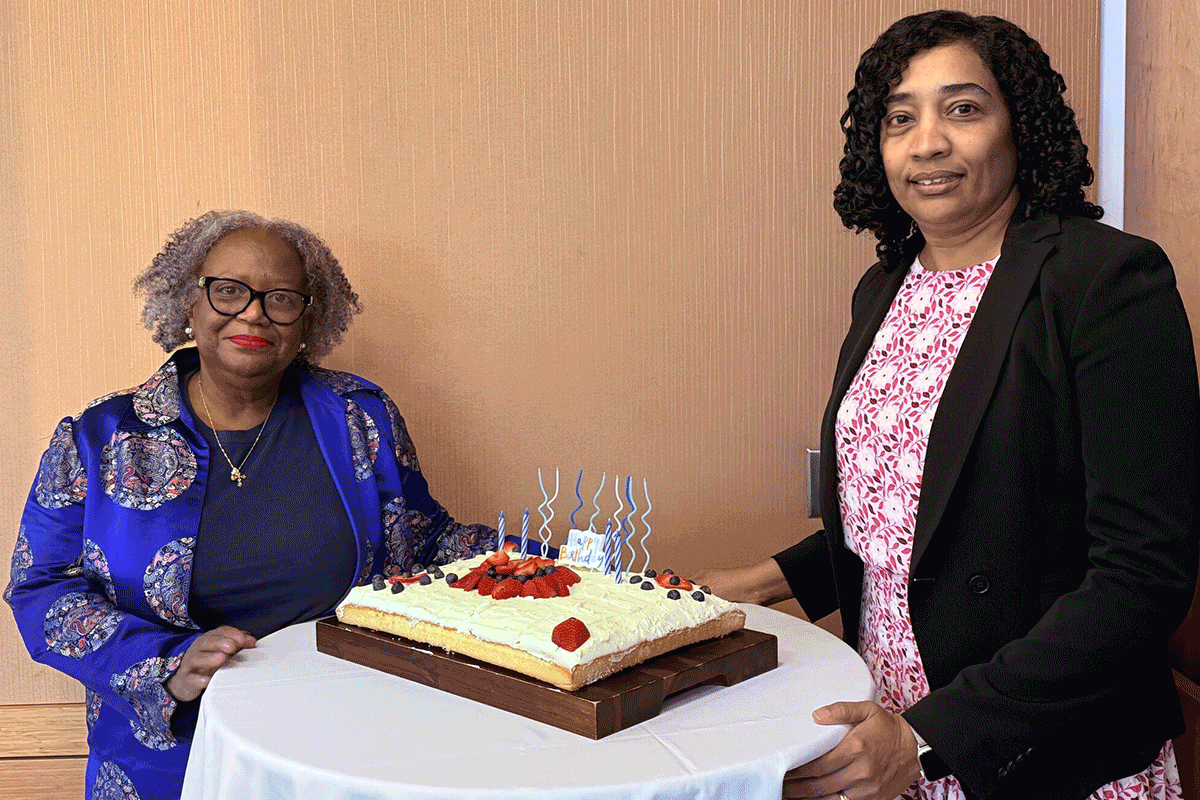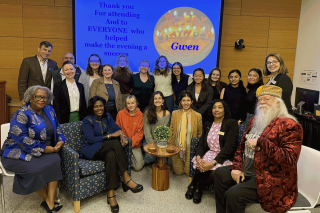“When most of us were at Simmons during the ’60s, ’70s, and ’80s, there were over 300 women’s-focused colleges. Today, there are less than 30,” said Karen Young-Thomas ’77, President of the Simmons University Alumnae/i Association. “Tonight, we celebrate the 125th anniversary of Simmons University [and its longstanding commitment to women-centered education]. . . . . We also celebrate yet another Simmons success story: that of our beloved Gwen Ifill ’77, ’93HD.”
On the evening of October 9, the Alumnae/i Association and The Gwen Ifill School of Media, Humanities, and Social Sciences hosted a hybrid birthday celebration for Ifill, entitled “A Conversation of Remembrance.” Ifill would have turned 69 on September 29.
Alumnae/i Friends Reminisce
“A Conversation of Remembrance” featured video clips in which several Class of 1977 alumnae/i shared cherished memories of Gwen Ifill.
For Dr. Vivian Toles Izuchi ’77 (whose daughter is a Class of 2019 alum), “Gwen was a very caring, warm, and loving person. . . . She was someone who had a dream that was realized.”
Bobbi Thompson ’77 (a proud parent of a Class of 2011 alum) remembers Ifill’s practice of “everyday leadership,” which was propelled by truth, curiosity, and confidence. Thompson also recalled how important it was for Ifill to be a mentor for the next generations. “She had personal relationships with young women in whom she saw potential, or the same yearnings that she had to make a difference in the world,” she said.
Other former classmates reminisced about Ifill’s wisdom, integrity, and diplomacy. Still others suggested that Ifill found her voice—the ability to speak up confidently and make an impact—at Simmons.
“As African American women at Simmons, we understood that we stood upon the shoulders of all those who came before us. We knew it was our responsibility to stand tall, determined, and strong. Gwen exemplified these attributes, and she always carried herself with grace, dignity, and pride,” said Christine Keys ’77. “Gwen was taken away from us too soon, yet she left an indelible mark upon the world. . . . [On this day of celebration] I say, ‘Cheers!’ to Gwen. Your light forever shines.”
Realizing the Simmons Mission
Young-Thomas introduced Dr. Roberto “Bert” Ifill, Gwen’s older brother and Simmons Trustee. After receiving his PhD in Economics from Yale University, Bert Ifill served as a professor of economics and later dean at Williams College from 1983 to 1989. Since then, he has held leadership positions at numerous universities and the Andrew W. Mellon Foundation. Ifill is also a professional musician and poet.
Ifill read a poem he wrote about his sister’s first day at Simmons. The verses describe a “dark-skinned girl” arriving at “the cradle of independence.” With encouragement from her father and her innate perseverance, she became a reporter. Ifill’s poem ends with these lines: “On the way to exploring what, she discovered why. / The world needed to work better. / To move ever so slightly toward the light. / . . . She moved the world ever more rightly, / She left us with more work to do.”
According to Ifill, Simmons was a key part of his sister’s development. He explained how Simmons was Gwen’s first choice of college, and she received a handsome financial aid package. She loved the Boston location, the small class sizes, the women-centered environment, and founder John Simmons’ commitment to equity and social justice.
“Since Gwen’s graduation, she tried to exemplify that [the Simmons mission], as a mentor, as a colleague, and sometimes as a competitor,” he said.
Ifill Brother and Ifill Dean in Conversation
Dr. Ammina Kothari, Dean of The Gwen Ifill School of Media, Humanities, and Social Sciences, joined Bert Ifill in a conversation about family, maturation, and inspiration. “I am very honored to lead a school named after Gwen,” she said. “[Gwen Ifill] was not only a talented journalist, but she was also an advocate for diversity in media and education. . . . She taught us how journalism can give a voice to those who are marginalized and silenced.”
Kothari and Ifill discussed their unique childhood upbringings. Ifill explained the significance of growing up in a large congregation, as his father, the Reverend O. Urcille Ifill Sr., was an African Methodist Episcopal pastor. “[Gwen and I] were under the watchful care of many a church lady,” said Ifill. “And we were the children of immigrants . . . so we were Black, but we were not Black. And it was fascinating to navigate this.” Ifill also highlighted the importance of reading as children. He and Gwen “were very interested in the life of the mind . . . the library was our Saturday morning playtime,” he said.
In response, Kothari shared her immigrant experience. She grew up in Tanzania, though her grandparents came from India and Madagascar. During her childhood, Kothari learned and spoke three languages (Swahili, Gujarati, and English). “I also remember having to navigate being the only Brown person in my primary school classes,” she said. Kothari credits her mother for instilling in her a passion for education and learning.
Turning to the topic of storytelling, Kothari said, “We are inundated with information. . . . It is hard to process all of that, but if I tell you a story, you will remember it.” She described how immigrant communities are deeply invested in storytelling, which enables the culture to survive. “And when journalism is done well . . . [it harnesses] the power of listening and storytelling.”
Ifill recalled his sister saying “‘Get it right!’ And I interpreted that as not only getting the stories right, but getting the right stories. . . . [In other words, good journalists] cover people who are generally ignored.”
When discussing Gwen Ifill’s enduring legacy at Simmons, her brother noted that very few schools are named after African American women. “This shows you how much Simmons cares about her,” said Ifill. “I don’t have to fight for Gwen’s legacy [at Simmons], as it’s an organic part of how this University operates.”
As Kothari explained, “At the Ifill School, we take Gwen’s legacy very seriously . . . this is a place to think outside the box, find your voice, and take risks. . . . Being able to communicate effectively, speak eloquently, and connect with diverse communities [are important skills that we teach here].”
Ifill emphasized the significance of a broad education, which diversifies one’s perspectives and informs one’s interpersonal exchanges. “The world is bigger than one’s own ego and personal ambitions, and Simmons graduates contribute to the world’s development.”
Interacting with the Simmons community today, Ifill “can still see that spark and mission [of Gwen Ifill] alive. . . . A pleasure of mine [as a Trustee] is being able to interact with Simmons students, and to learn from them as I learn about them,” he said.

Reflections from Faculty and Students
Department of Communications faculty member Bruce Gellerman, an award-winning journalist and former WBUR correspondent, engaged with students from his Ifill School Journalism (COMM 260) course in a conversation about Ifill’s professional accomplishments.
Gellerman has particularly vivid memories of the televised 2004 Vice Presidential debate that Ifill moderated. During this debate, Ifill asked the candidates, Vice President Dick Cheney and Senator John Edwards, about the frighteningly high rate of AIDS among African American women, and what role the United States government should play to address this epidemic. Ifill’s question left both candidates stupefied. “She asked a very simple question, and she just skewered them,” said Gellerman. “Her tenacity was extraordinary.”
When asked about how they resonate with Gwen Ifill’s story and legacy, Simmons students championed Ifill’s perseverance and fearlessness within a male-dominated profession that lacks racial diversity. They also derived inspiration from her curiosity and passion.
Professor of Communications Bob White, one of Gwen Ifill’s professors at Simmons, reiterated poetic excerpts that he had delivered at her memorial service. White memorialized Ifill’s brilliance and humanity with artistry, wit, and poignancy.
Consecrating Ifill’s legacy further, Young-Thomas announced the Gwen Ifill Paid Internship Program. Co-administered by the Ifill School and the Alumnae/i Association, this program will launch in Fall 2025. We invite you to make a contribution to the program.
President Lynn Perry Wooten delivered the closing remarks. “As I walk in the halls every day, I think of Gwen’s legacy often, and especially during this election year,” she reflected. “Today, the Ifill School continues Gwen’s legacy by cultivating the new generation of trailblazing leaders.”
To honor Ifill’s 69th birthday, Wooten read one of her favorite Ifill quotes: “‘We cannot expect the world to get better by itself. We have to create something that we can leave for the next generation.’ At Simmons, the Ifill School is living and carrying on these important words. Thank you, and happy birthday Gwen.”


